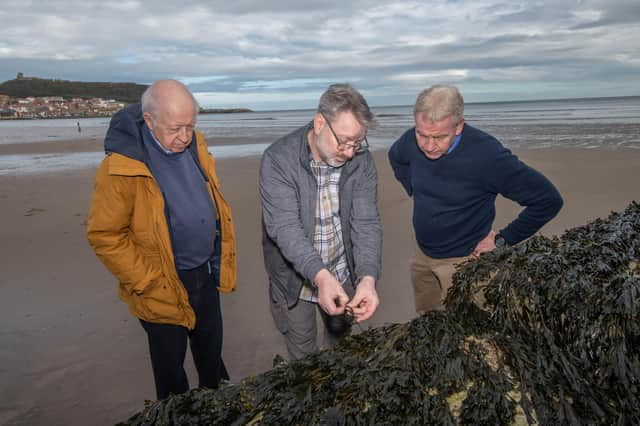Seaweed testing under way in Scarborough South Bay to pinpoint origins of water pollution


Durham University, funded by North Yorkshire Council and McCain Foods, has been brought in to conduct the tests which are hoped to provide evidence of the origins of the pollution.
Professor Darren Gröcke, who is the director of the Stable Isotope Biogeochemistry Laboratory (SIBL) at Durham University, has started to collect seaweed samples along the coast in a project which is expected to last a year.
Advertisement
Hide AdAdvertisement
Hide AdRichard Flinton, North Yorkshire Council’s chief executive, said: “The quality of the bathing water along the North Yorkshire coast is hugely important to North Yorkshire Council.
“Thankfully, the majority is rated as either good or excellent, but we want that to be the case for Scarborough’s South Bay too.
“As well as wanting this resolved for our residents, the coast is a key draw for our visitor economy, which impacts directly on people’s businesses and livelihoods. And although improving bathing water is not within our gift as the council, we are tackling it head-on.”
Cllr Carl Les, North Yorkshire Council’s leader, said: “We’re really pleased to be working with McCain Foods to help fund Professor Gröcke to carry out some innovative testing to try and improve the water quality in South Bay.”
Advertisement
Hide AdAdvertisement
Hide AdIt is anticipated that through nitrogen analysis of more than 5,000 seaweed samples taken from the coast near the village of Crowdon to Filey, Professor Gröcke will be able to determine where and what kind of pollution is impacting on the coastal environment.
Samples taken from Yorkshire Water’s Scarborough wastewater treatment works, the first-time a water company has provided samples for this type of analysis, will also be used in the study.
Professor Gröcke said: “By sampling the latest growth part of seaweed, collected along the coast, we can analyse its nitrogen isotopes and from that, we can determine where the pollution is coming from.”
The project will cost £30,000 and is being jointly funded by North Yorkshire Council and McCain Foods, which is in the final phases of a £23 million investment to upgrade its wastewater treatment plant at its factory in Scarborough.
Advertisement
Hide AdAdvertisement
Hide AdAndy Bates, vice-president of manufacturing at McCain Foods, said: “As a proud business in Scarborough for over 50 years, we are committed to playing our part in the local community.
“We are pleased to be supporting this study and look forward to hearing the outcome of Professor Gröcke’s research.”
The council brought partners and agencies together for a summit in Scarborough in October last year to help improve the water quality in the town’s South Bay.
Organisations involved included the Department for Environment, Food and Rural Affairs, East Riding of Yorkshire Council, the Environment Agency, McCain Foods and Yorkshire Water.
Since the summit, Yorkshire Water has invested some £2.8 million to reduce the number of discharges into the sea.